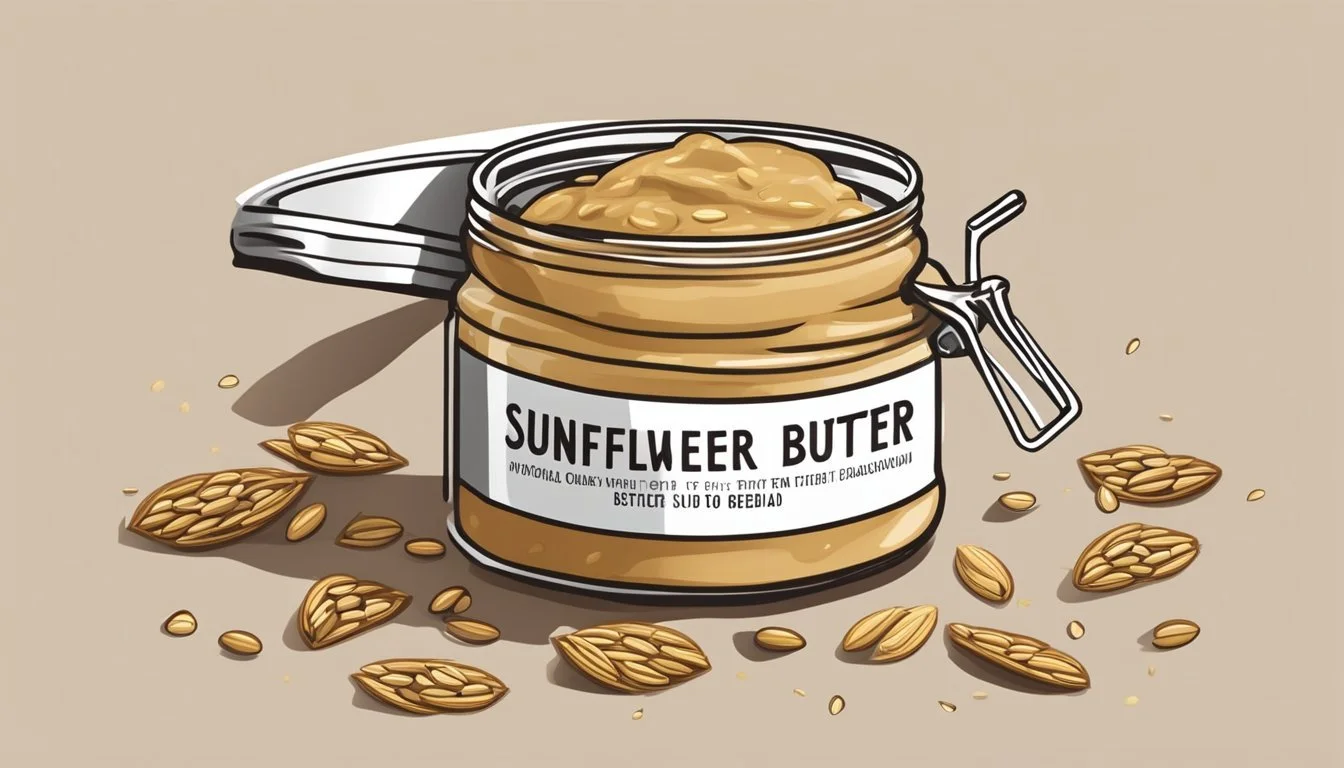Sunflower Seed Butter Substitutes
Top Alternatives for Nut-Free Spreads
Finding the right substitute for sunflower seed butter can be a challenge, especially for those with allergies or specific dietary needs. Whether you're seeking alternatives due to an allergy or simply looking for a new flavor or texture, there are several options available. Soy nut butter is a perfect nut-free substitute, closely matching the texture and protein content of sunflower seed butter.
For those who enjoy the richness of nuts, almond butter and peanut butter offer excellent alternatives. Almond butter is especially noted for its nutrient-rich profile, being high in vitamin E and healthy fats. Tahini, made from sesame seeds, offers a unique taste and creamy texture, making it another worthy replacement.
Considering nut and seed allergies, Wowbutter and pumpkin seed butter are other viable options. Wowbutter is known for its kid-friendly appeal, while pumpkin seed butter provides a delightful earthy flavor along with beneficial nutrients. Each of these substitutes brings its own twist to the table, ensuring that there's a suitable option for every preference and dietary requirement.
Understanding Sunflower Seed Butter
Sunflower seed butter is a popular alternative to nut butters, known for its rich nutritional profile and versatility in culinary applications. It combines proteins, healthy fats, and essential vitamins and minerals making it a nutritious option.
Composition and Nutrition Profile
Sunflower seed butter is made from roasted sunflower seeds. It is rich in protein, offering around 7 grams per serving. This makes it a good source of plant-based protein. It also contains unsaturated fats, which are heart-healthy and can help reduce cholesterol levels.
The butter is an excellent source of vitamin E, a powerful antioxidant that helps protect cells from damage. It also includes fiber, which promotes digestive health, as well as minerals like magnesium, phosphorus, and folate, each contributing to various bodily functions. Additionally, it contains B vitamins which are crucial for energy production and brain function.
Culinary Uses and Texture
Sunflower seed butter can be used in a variety of ways in the kitchen. Its creamy texture makes it easy to spread on bread or crackers. It can also be blended into smoothies, used as a dip for fruits or vegetables, or incorporated into baking recipes like cookies and energy bars.
Its stable texture means it can replace nut butters in almost any recipe. When substituting, use a 1:1 ratio for peanut butter, almond butter, or other spreads. This makes it versatile and easy to use, especially for those with nut allergies.
Taste and Flavor Profile
The flavor of sunflower seed butter is often described as earthy and slightly sweet. It has a more subtle taste compared to peanut or almond butter. The roasting of sunflower seeds enhances their nutty flavor, giving the butter a richer and deeper taste.
Some sunflower seed butters are sweetened or salted to improve taste, but natural versions are available for those who prefer a purer flavor. The overall taste makes it a flavorful addition to both sweet and savory dishes.
Health Benefits
Sunflower seed butter offers numerous health benefits due to its nutrient-rich profile. The high protein content supports muscle growth and repair, while the fiber aids in digestion. Vitamin E present in the butter acts as an antioxidant, contributing to skin health and immune function.
The unsaturated fats help maintain cardiovascular health. Minerals like magnesium and phosphorus support bone health, and folate is essential for DNA synthesis and repair. B vitamins further enhance energy levels and cognitive function. This combination of nutrients makes it a beneficial addition to a balanced diet.
Substitutes for Sunflower Seed Butter
When looking for alternatives to sunflower seed butter, one can explore options like nut-based butters, seed-based butters, and allergen-friendly alternatives. Each choice has its unique benefits and potential drawbacks.
Nut-Based Substitutes
Peanut Butter: Peanut butter stands out for its rich, nutty flavor and high protein content. It is often richer in taste compared to sunflower seed butter. However, it is not suitable for those with peanut allergies.
Almond Butter: Almond butter offers a mild and slightly sweet taste. It is a popular alternative due to its nutritional benefits, including higher vitamin E content. Almond butter is also versatile for use in spreads, baking, and cooking.
Cashew Butter: Cashew butter is known for its creamy texture and mild, sweet flavor. It can serve as a good substitute for sunflower seed butter in recipes that require a smoother consistency. Cashew butter is also rich in healthy fats and minerals.
Seed-Based Substitutes
Pumpkin Seed Butter: Pumpkin seed butter provides a unique, earthy flavor that can be a delightful change. It is also rich in magnesium and zinc, offering specific health benefits. This butter is great for those seeking a nut-free alternative with a different taste profile.
Tahini: Made from sesame seeds, tahini has a slightly bitter and nutty flavor. It is commonly used in Mediterranean and Middle Eastern cuisines. Tahini is a great source of calcium and is suitable for both sweet and savory dishes.
Hemp Seed Butter: Hemp seed butter provides a nutty, slightly grassy flavor and is rich in omega-3 and omega-6 fatty acids. It is a nutritious alternative and can be used similarly to sunflower seed butter in various recipes.
Nut-Free and Allergen-Friendly Alternatives
Wowbutter: This soy-based alternative mimics the taste and texture of peanut butter. It is designed to be a safe option for those with nut allergies, providing a similar culinary experience without the allergen risk.
Pumpkin Seed Butter: In addition to being a seed-based substitute, pumpkin seed butter is also nut-free and serves as an excellent allergen-friendly option.
Flax Seed Butter: Flax seed butter offers a mild flavor and is rich in omega-3 fatty acids. It is suitable for people looking for a non-nut alternative that provides nutritional benefits similar to those of sunflower seed butter.
Chia Seed Butter: Chia seed butter, while less common, provides a gelatinous texture and mild flavor. It is nutrient-dense, offering omega-3 fatty acids and fiber, making it a healthy choice for those avoiding nuts.
Incorporating Substitutes in Various Dishes
Substituting sunflower seed butter in recipes can provide a variety of flavors and textures suitable for different dietary preferences, including gluten-free, vegan, paleo, and keto diets. Below are practical ways of incorporating these substitutes into baked goods, salads, savory dishes, smoothies, and toppings.
Baked Goods and Desserts
When used in baked goods, substitutes like almond butter or peanut butter can bring a distinct nutty flavor and creamy texture. Almond butter, high in vitamin E and magnesium, can enhance cookies, cakes, and muffins, maintaining moisture and richness.
Cashew butter is another excellent option, offering a mildly sweet taste that pairs well with brownies and gluten-free desserts. For a roasted flavor, consider using pecan butter in your paleo and keto-friendly recipes. Each of these options can replace sunflower seed butter in equal parts, ensuring your baked goods remain delicious and satisfying.
Salads and Savory Dishes
Tahini, made from ground sesame seeds, adds a rich, nutty flavor to salads and savory dishes. Use it as a base for dressings or directly incorporate it into salads for a creamy texture.
Pine nuts, with their mild flavor and soft crunch, are perfect for pesto or as a delightful topping for salads. Chopped almonds and pecans offer a robust texture when sprinkled over salads. These substitutes ensure that whether you're making vegan, paleo, or keto dishes, you can achieve the desired texture and taste without sunflower seed butter.
Smoothies and Toppings
Peanut butter and almond butter are fantastic for smoothies, providing a protein boost and creamy consistency. They blend well with various fruits and vegetables, making them suitable for breakfast or post-workout smoothies.
Pumpkin seed butter, rich in nutrients, is a great alternative for those adhering to vegan or allergy-sensitive diets. For toppings, consider using tahini or chopped nuts over your smoothie bowls or oatmeal. These alternatives offer versatility and can elevate the flavors and nutritional value of your smoothies and toppings, catering to diverse dietary needs.
Incorporating these substitutes thoughtfully into your recipes can enhance your culinary creations while accommodating different dietary preferences.
Texture and Flavor Considerations
Texture and flavor play crucial roles when choosing a substitute for sunflower seed butter.
Texture: Look for substitutes with a creamy consistency similar to sunflower seed butter. Peanut butter, for instance, offers this desirable trait, making it a smooth alternative. Almond butter also possesses a rich, creamy texture, enhancing the mouthfeel of recipes.
Flavor: The flavor profile is equally important. Sunflower seed butter has a nutty, mild flavor that blends well in various dishes. When selecting substitutes, consider options that match or complement this profile.
Nut-Based Alternatives:
Almond Butter: High in vitamin E and magnesium, with a mild, slightly sweet flavor.
Cashew Butter: Creamy and rich, with a subtle, nutty taste.
Peanut Butter: Offers a richer, more intense nutty flavor, with more protein and fewer calories.
Seed-Based Alternatives:
Pumpkin Seed Butter: High in protein and offers a unique, slightly earthy taste.
Tahini: Made from sesame seeds, it provides a distinct, bold flavor, different yet complementary.
For those looking for similar shapes and sizes, chopped nuts such as pecans or walnuts can provide a textural crunch and rich taste.
Table Comparison:
Substitute Texture Flavor Profile Almond Butter Creamy Mild and slightly sweet Cashew Butter Rich and creamy Subtle, nutty Peanut Butter Smooth Rich, intense nutty Pumpkin Seed Butter Creamy Slightly earthy Tahini Thick, creamy Bold and distinct
Each substitute offers unique texture and flavor traits to complement sunflower seed butter in recipes. Choose based on desired consistency and flavor profile to achieve the best results.
Nutritional Considerations for Specialty Diets
When exploring sunflower seed butter substitutes, it's essential to consider their nutritional profile, especially for those on specialty diets.
Almond Butter
Almond butter offers healthy fats and is rich in omega-3 fatty acids, making it suitable for heart health. It also provides iron and calcium, which are essential for strong bones and overall vitality.
Peanut Butter
Peanut butter is another alternative known for its high protein content and relatively low calorie count. It contains omega-6 fatty acids but lacks omega-3 fatty acids. It's a good option for those not allergic to peanuts.
Cashew Butter
Cashew butter is creamy and nutrient-dense. It provides healthy fats, essential omega-3 fatty acids, and a good amount of iron and magnesium. This makes it ideal for boosting energy levels and supporting nervous system health.
Wowbutter
Wowbutter is a peanut-free alternative, often made from soy. It is rich in protein and can be fortified to include various vitamins and minerals, making it a versatile option for those with nut allergies.
Pumpkin Seed Butter
Pumpkin seed butter is packed with nutrients and offers both omega-3 and omega-6 fatty acids. It also contains zinc and iron, which are vital for immune function and energy production. Additionally, it's a good source of magnesium.
Tahini
Tahini, made from sesame seeds, provides calcium, iron, and healthy fats. It's a staple in many plant-based diets due to its nutritional density and versatile use in various recipes.
Substitute Key Nutrients Specialty Diet Compatibility Almond Butter Omega-3, Iron, Calcium Vegan, Heart Health Peanut Butter Protein, Omega-6 Fatty Acids Non-Allergic, Protein-Rich Diets Cashew Butter Omega-3, Iron, Magnesium Energy Boosting, Nervous System Health Wowbutter Protein, Fortified Vitamins/Minerals Nut Allergies, General Health Pumpkin Seed Butter Omega-3, Omega-6, Zinc, Iron Immune Function, Energy Production Tahini Calcium, Iron, Healthy Fats Plant-Based, Nutritional Density
These substitutes ensure you can maintain a balanced diet while catering to specific dietary needs.
Resourceful Uses of Substitute Ingredients
When substituting for sunflower seed butter, it's essential to consider both the flavor profile and nutritional benefits of the alternative ingredients. Sunflower seed butter substitutes can be quite versatile, ranging from use in snacking to more complex culinary creations.
Snacking and Trail Mix Options
Substitute ingredients such as almond butter, peanut butter, and cashew butter can enhance snack-time. These nut butters are excellent when paired with fruit slices, celery sticks, or crackers.
For homemade trail mix, incorporating roasted sunflower seeds or hulled sunflower seeds can provide a satisfying crunch. Combine these with dried fruit like raisins or dried cranberries, and you have a nutrient-dense snack perfect for on-the-go energy. Granola bars can also benefit from these nut butters, adding a creamy texture.
Homemade Butter and Spreads
Creating homemade butter and spreads using substitute ingredients is simple yet rewarding. Utilizing a food processor, blend nuts such as peanuts, almonds, or even pumpkin seeds until smooth.
Add a pinch of salt and a bit of honey or maple syrup for natural sweetness. This method can not only save calories but also allow customization of flavors to suit personal preferences. Homemade hummus can also be elevated by replacing traditional tahini with almond butter, giving it a unique twist.
Culinary Creativity with Substitutes
In culinary applications, these substitutes offer versatility. Almond butter can be used in baking, adding moisture to cookies and brownies without overpowering other flavors.
Peanut butter is excellent for savory dishes like stir-fries or as a base for Asian-inspired sauces. Cashew butter’s mild taste pairs well with smoothies and dressings. Additionally, experimenting with pumpkin seed butter can bring a nutty, slightly earthy flavor to soups and stews, showcasing the culinary creativity possible with these alternatives.
Exploring these resourceful uses not only diversifies meals but can also lead to healthier and more flavorful dishes.
Considerations for People with Food Allergies
When choosing a sunflower seed butter substitute, individuals with food allergies need to be cautious. For those with nut allergies, avoiding tree nut butters like almond or cashew butter is essential, even if one does not have a peanut allergy. Always check if the alternatives are produced in facilities that handle nuts to prevent cross-contamination.
Affordable alternatives might include products such as pea butter or soy butter. Both are protein-rich and cater to different dietary needs.
People with multiple allergies must be meticulous. For instance, hummus, made from chickpeas, can be a good source of protein. However, those allergic to legumes might also react to chickpeas.
Gluten-free options are also available. Many seed and nut butter substitutes, including sunflower seed butter, are naturally gluten-free. Always verify the label to ensure there is no gluten contamination during processing.
Here is a quick list of some sunflower seed butter substitutes to consider:
Soy butter
Pea butter
Tahini (sesame seed butter)
Pumpkin seed butter
Hummus (for those without legume allergies)
Important Note: Always read ingredient labels carefully and consult with a healthcare provider or allergist to ensure the chosen alternative is safe for individual dietary restrictions.
Substitutes are not one-size-fits-all, and personal sensitivity levels may vary. Understanding these considerations helps in making safer choices.
By mindfully selecting allergy-friendly and gluten-free options, individuals can enjoy a variety of spreads without compromising their health.
Purchasing and Storage Tips
When purchasing sunflower seed butter substitutes, it's essential to consider a few factors to get the best product.
Raw vs. Roasted: Raw seed and nut butters often have a milder flavor compared to roasted varieties. Roasting enhances the taste, making it richer and sometimes slightly sweeter.
Salted vs. Unsalted: Some substitutes come salted, which can be a great addition for those who prefer a savory taste. However, unsalted varieties offer versatility for both sweet and savory dishes.
Affordable Options: Peanut butter is typically one of the most affordable sunflower seed butter substitutes. Pumpkin seed butter and tahini can also be cost-effective, especially when bought in bulk.
Refrigeration: Most seed and nut butters should be stored in the refrigerator to prevent oils from becoming rancid.
Room Temperature: Some butters, like peanut butter, can be stored at room temperature if they will be used quickly.
Sealing: Always ensure the lid is tightly sealed to keep the product fresh.
Packaging: Look for airtight containers to maintain freshness. Glass jars with tight lids are preferable.
Shelf Life: Check the expiration date and consume the product within the recommended time. Roasted and salted varieties may have a longer shelf life due to the reduced moisture content.
By considering these tips, one can enjoy the full benefits of sunflower seed butter substitutes in various dishes.






